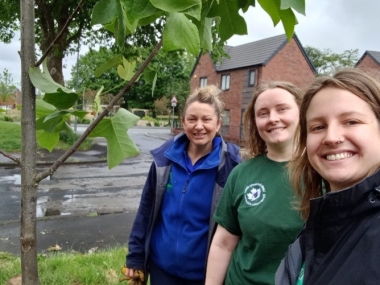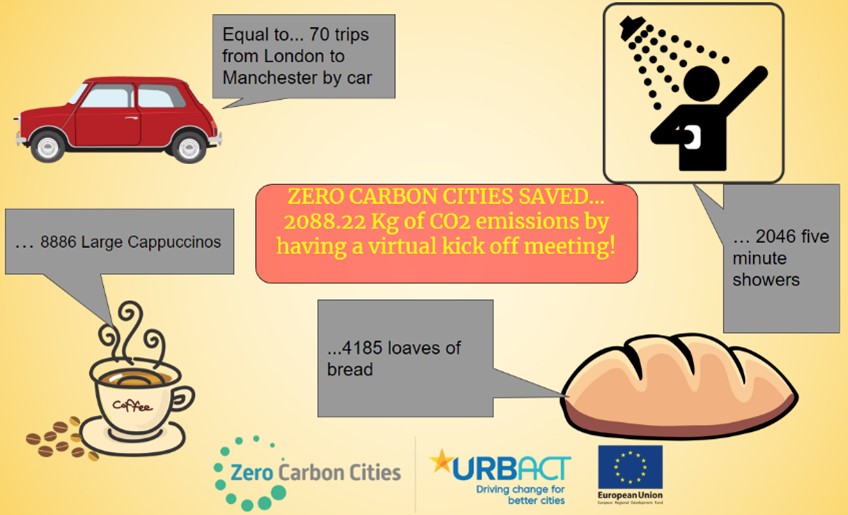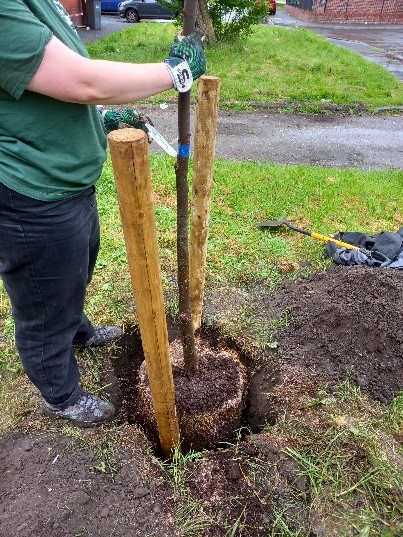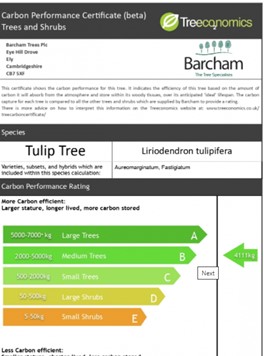The Networks Carbon Mitigation Commitment
Edited on
13 July 2022With the theme of the Zero Carbon Cities project focused on mitigating against the effects of climate change, we felt it was important that we made our best effort to reduce our impact on the climate throughout the delivery of the project.

The pandemic gave us the kick start we needed to move away from physical meetings and international travel, by forcing us to work from home and adapt to deliver the project virtually. Through multiple surveys on the project, we gathered data from the partners and worked out our carbon savings using the Greentripper(link is external) carbon calculator.
Here are the carbon savings made from having a virtual kick off meeting which was a fun exercise that provided some hope during the pandemic.
Although we adapted to the online delivery of the project very well, we felt that some meetings in person were essential to delivering the project. Thankfully, the pandemic arrived after the project began so all the partners were able to attend two development phase meetings in Manchester allowing us to establish a good working relationship. This was important in the early stages to get everyone engaged which is more difficult online as we have seen when establishing ULG’s on the project. The study visits were also able to go ahead with the Lead partner and Lead expert visiting all the partner cities. This allowed  the coordinators to develop a thorough understanding of each of the city’s specific circumstances, which would be difficult to do online without experiencing that first-hand. Towards the end of the project, travel restrictions were eased which allowed us to peer review the IAP’s as a group in Brussels and have a final event in person back in Manchester.
the coordinators to develop a thorough understanding of each of the city’s specific circumstances, which would be difficult to do online without experiencing that first-hand. Towards the end of the project, travel restrictions were eased which allowed us to peer review the IAP’s as a group in Brussels and have a final event in person back in Manchester.
Virtual meetings still hold a carbon footprint which can often be forgotten and certainly isn’t insignificant when considering all the meetings that took place throughout the project. Highlighted in an article for C-Change (Covid's Silver Lining: Carbon Saving | URBACT), we have been able to assume that an hour video call emits anywhere between 150grams-1000grams.
Taking this all into account we have worked out that the total kgCo2 emissions spent on the project were 23,123.07 KG. It’s a huge amount equating to 5 petrol powered cars driven for a year or 2.9 homes energy use for a year (Greenhouse Gas Equivalencies Calculator | US EPA(link is external)).
Carbon Offsetting
To help reduce th e projects impact on the environment, URBACT have implemented a new policy that allows for the project to invest €2,000 into carbon offsetting measures. After consulting with all the partners on the project, Zero carbon cities have decided to plant trees both in Manchester and soon to be in Modena also.
e projects impact on the environment, URBACT have implemented a new policy that allows for the project to invest €2,000 into carbon offsetting measures. After consulting with all the partners on the project, Zero carbon cities have decided to plant trees both in Manchester and soon to be in Modena also.
In Manchester we worked with Groundworks, a federation of charities that mobilise practical community action on poverty and environment across the UK. Francesca and team (pictured) know the neighbourhoods of Manchester well and found the most suitable little spot in Gorton Park for the trees to be planted. They were dedicated to plant the trees in the rain and in time for our project final event where we were able to show off the trees and take our group picture with them.
The trees were also planted in partnership with the City of Trees project, an ambitious movement to plant a tree for every citizen of Manchester within 5 years. With theirs and Manchester councils inhouse expertise we were able to get advice on the most efficient tree species to capture the maximum amount of carbon we could. Tulip trees were recommended based on price, capture efficiency and size that was most suitable  for the planting area. Two trees have been planted in pots so far with the remaining trees to be planted in the autumn which is the most appropriate season for trees to be planted. In Modena they are also plan to plant in the Autumn which allows for more trees to be planted for less money. With each Tulip tree estimated to capture 4111kgCo2 across their lifetime, planting 6 of these trees will cover the projects carbon emissions on the project. Maintenance of the trees will continue post project with extra funding found to ensure the trees are well watered, looked after and not cut down.
for the planting area. Two trees have been planted in pots so far with the remaining trees to be planted in the autumn which is the most appropriate season for trees to be planted. In Modena they are also plan to plant in the Autumn which allows for more trees to be planted for less money. With each Tulip tree estimated to capture 4111kgCo2 across their lifetime, planting 6 of these trees will cover the projects carbon emissions on the project. Maintenance of the trees will continue post project with extra funding found to ensure the trees are well watered, looked after and not cut down.
Submitted by Laura McIntosh on
